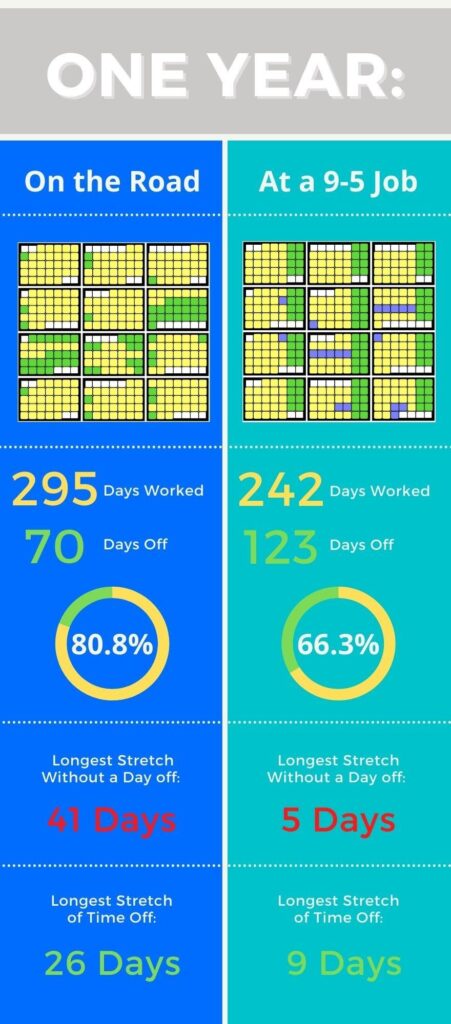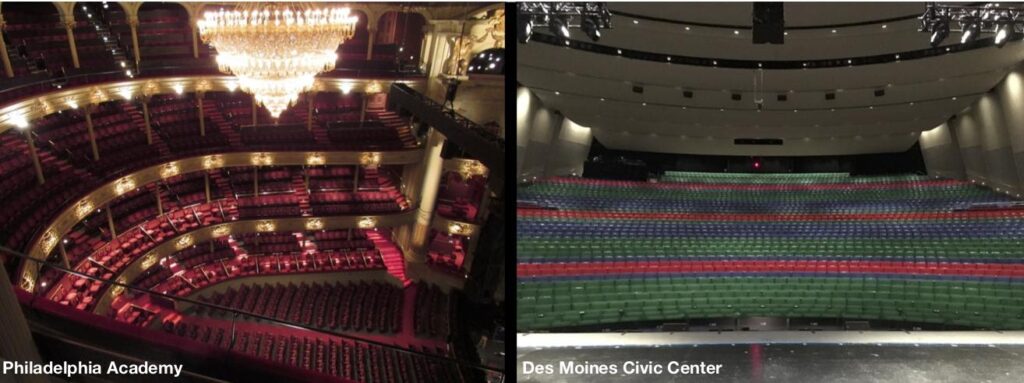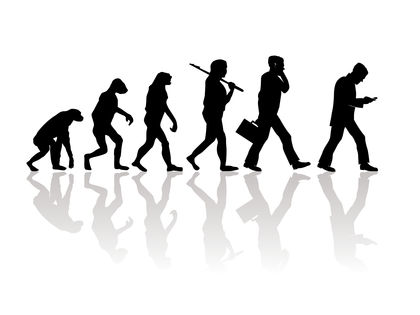I’ve been on the road for the better part of a decade, so I’ll easily admit that I’m biased in favor of tour life, but it’s fascinating to hear what other people think my work is like. Mostly they see the glamour of a life that some only dream of being paid to travel across the country or even the world. They’re less enamored when they hear what my work schedule actually entails and that I’m not some carefree nomad having adventures and playing pretend every night. Still, I bet most would give it a go if they ever got the chance.
So what does the reality of touring look like? Well, let’s start with the least appealing side of it and get that out of the way
Time and Stress
Since tours only make money when they’re actively on the road, the ideal is to be booked constantly. Most shows have a few weeks scattered throughout the schedule that aren’t booked and the actors, musicians, and crew are laid off. To a 9-5 worker, “layoff” is a horrible word, but on tour, it’s synonymous with a scheduled, short, unpaid vacation, and you’re still working 45-50 weeks out of the year. However, that means there’s limited time off to see friends and family back home or just to recharge, and it can be difficult to get time off for events like weddings, graduations, or even family emergencies.
Then you have your day-to-day work schedule. On a whim, I calculated how many days I’ve had off in an average year on tour. That qualifies as a day not in the theatre, not traveling to the next venue, nothing work-related. My average was 70-75 days off per year over seven years on the road. To put it in 9-5 terms, if you just count weekends that’s two days off a week, multiplied by 52 weeks, most people get 104 days off in a year, not even looking at holidays or vacation time.

(Touring data based on my 2019 year on tour with Miss Saigon, then Mean Girls.)
Plus, 40-hour work is the norm, but on the road, you’re looking at anywhere from a 60 – 80 hour workweek depending on how often you have to load in and out.
Moving on to stress
Somedays tour feels like holding 10 pounds of crazy and staring at a 5-pound bag, trying to formulate a plan that gets everything in. Each show and every venue have quirks and your job is to figure out how to work with or around them. Sometimes it’s easy: in Cleveland, there’s only space for the actual show deck onstage, so the local crew knows that amp racks typically go in an alcove in the house. Other times it takes some finagling: in DC, the Les Mis speaker towers weighed about 3000 lbs all together, but the structure the motor was attached to could only support 2000 lbs, so I calculated a way to build most of the tower, then slide the rest into place so we didn’t exceed the weight limit and still kept most of the build on the motor instead of overtaxing our manpower.

But, if you think that sounds stressful, those are the times when things went pretty well and we were able to come up with a solution that still accomplished the design. There are times you simply can’t do what you’ve planned: in Hartford, we had to get a mid-load in delivery of truss when the measurements we’d had for the rigging points were wrong. We found out partway into the day that the points were simply too far apart to safely fly the smaller truss we carried. Or something malfunctions right before the show is ready to start and you have a stage manager watching you, giving play-by-play commentary to the SM at the call desk as you attempt to suss out the problem, knowing the curtain is waiting on your troubleshooting skills.
These stressors can take a toll on your mental and emotional well-being, which affects your physical health. Fast and unhealthy food is much easier to access on the road, and the post-show default is to head to the nearest bar with your crew to unwind from the day and socialize. As an introvert, I had to learn to pay better attention to what I needed socially: some days it was respecting my need to relax, other times it was noticing that I’d lacked social interaction and, despite the habitual ease of just heading back to the hotel, I’d actually prefer to be out with the crew.
Mostly what it comes down to is fatigue. It takes a concerted effort to take care of yourself on the road: finding or choosing healthy foods, making time to exercise, checking in with yourself. Sometimes you don’t have the energy to deal with that after a long day of work, and your well-being falls to the wayside.

All that being said, touring sounds really appealing right? Well, let’s take a look at what’s kept me on the road for so long.
Experience
One huge benefit is experience. That same stress that fell into the Con column has equal footing in the Pro side by virtue of the adage “what doesn’t kill you makes you stronger.” Every load in and out, you’re handed new challenges to solve and, by the sheer repetition of it, you learn how to analyze situations faster and build a log of potential fixes you’ve tried before.
Plus, it’s all hands-on practice. You can talk about the theory as much as you want, but it will never be as beneficial as putting a contingency plan into action.

Along with problem-solving, you also (hopefully) gain people skills: just like analyzing situations, you also learn how to read people. Part of your job is learning if you can hand a project off to the house head and let them direct the crew, or if you’ll have to check in constantly to make sure it gets done. It’s noticing someone who’s willing to work, but is new and needs detailed directions, yet is too nervous to say they don’t understand. There are times you have to light a (figurative) fire to get a languorous crew moving, but others where you can joke and enjoy chatting and they’ll still get the job done.
The Pay
A large appeal of touring is the money. On the road, the company will provide you with accommodations or per diem for food and housing, so the majority of your survival expenses are taken care of. With that covered, it frees up the majority of your salary to pay down credit card debt, mortgages, or student loans, while simultaneously having some money to save or use for a guilt-free splurge. Personally, having the opportunity to up my savings percentage paved the way for me to discover the financial independence community, which is worth exploring no matter where you are in your financial journey. (Check out this list of FI blogs, or two of my favorites: JL Collins or Afford Anything)
The People
Last, but absolutely not least, are the people. Your crew and coworkers become family. Often boisterous and sometimes dysfunctional, you’ll find some of your best life-long friends on the road. When you’re together day in and day out, you help each other solve problems, pull off incredible under-the-wire show saves, or make it through a crappy day that you can laugh about afterward. Stagehands are the best kind of people I know to take lemons and turn it into an epic comedy of errors, and there are always new stories whenever you end up in the same city again to catch up.

Touring is life where the amp is always turned to 11
The lows are confidence-shattering and lonely, but the highs are soul-affirming and leave you with the feeling that there’s nowhere else you’d rather be.
I’m the first to tell anyone that they should absolutely tour if they have any desire to do it, but I’m also the first to say that it isn’t for everyone. I’ve learned that I’m built to tour. Even when I wasn’t sure if I was any good at sound, I still knew I loved touring: stressful situations are puzzles to solve and most days I thrive on the challenge, plus my family has always been understanding that I have very tight constraints on my schedule. The pros of touring outweigh the cons by a mile for me, however, even I (and my knees) know that the day I look towards getting off the road isn’t all that far down the line. For others, life on the road just isn’t appealing from the get-go: I know people who are amazing at their job but hate the lifestyle, the stress, and the mental and physical toll it takes.
It’s always important to take stock of how you honestly feel and refrain from talking yourself into signing up for another tour if the cons outweigh the pros. It’s not worth making yourself (and everyone you work with) miserable if you hate your life day in and day out.
But if you do like it, pack those suitcases and get ready for an adventure. I know I wouldn’t trade the experience for anything!








